人教版新课标英语必修一 Unit 4 Earthquakes Reading II 课件(26张PPT)
文档属性
| 名称 | 人教版新课标英语必修一 Unit 4 Earthquakes Reading II 课件(26张PPT) |
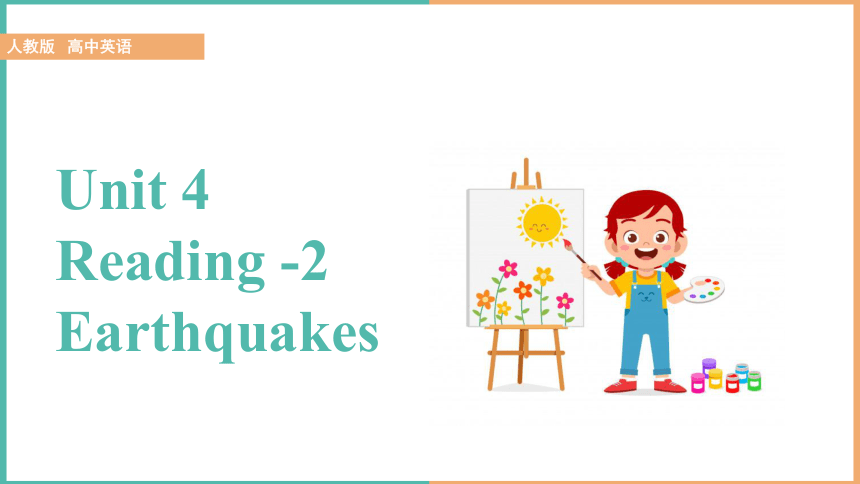
|
|
| 格式 | pptx | ||
| 文件大小 | 2.2MB | ||
| 资源类型 | 教案 | ||
| 版本资源 | 人教版(新课程标准) | ||
| 科目 | 英语 | ||
| 更新时间 | 2021-02-10 12:41:03 | ||
图片预览

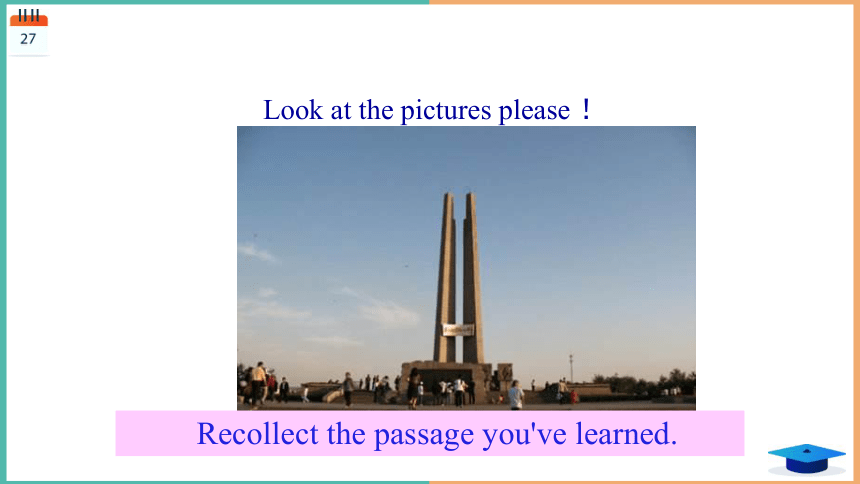
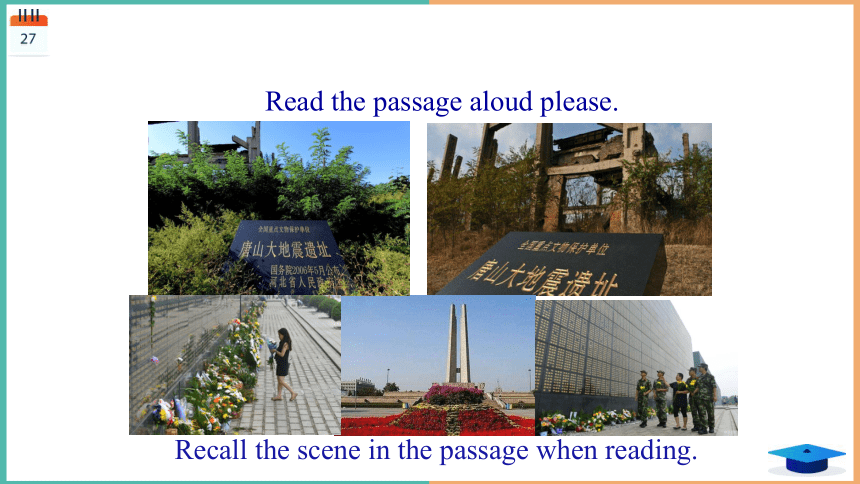
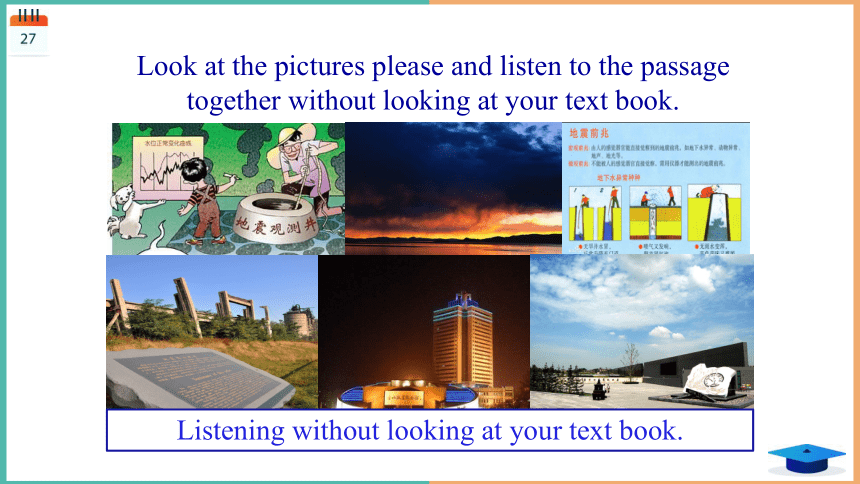
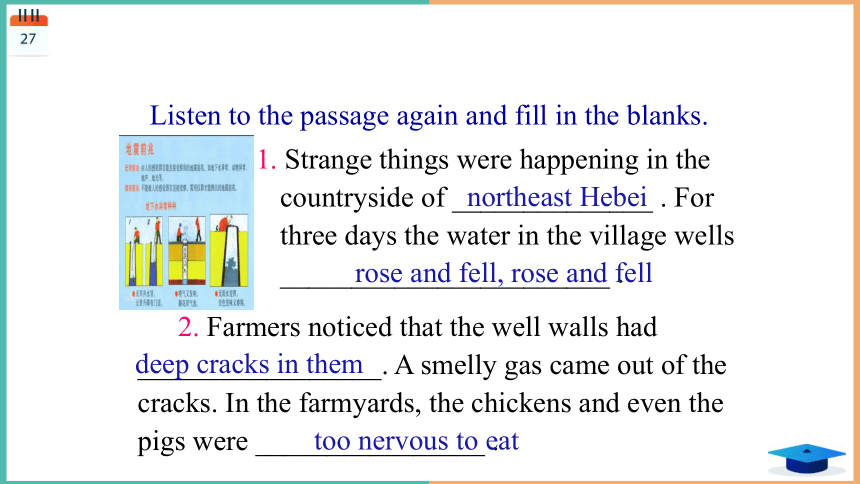
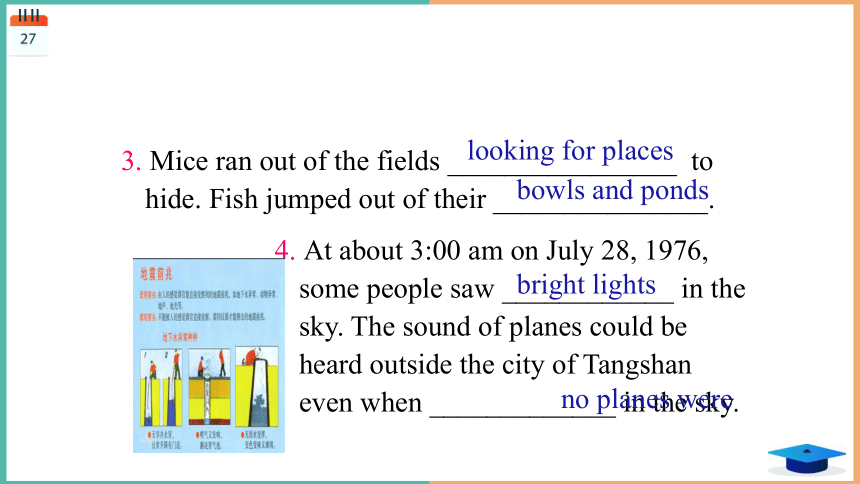
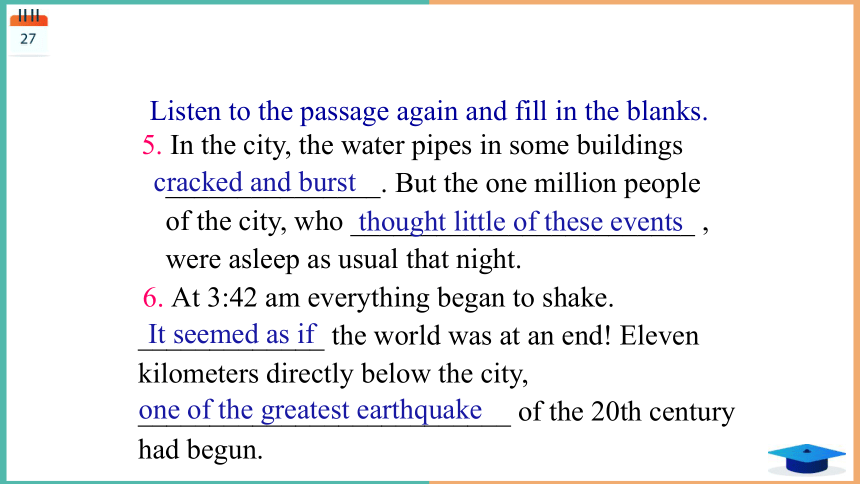
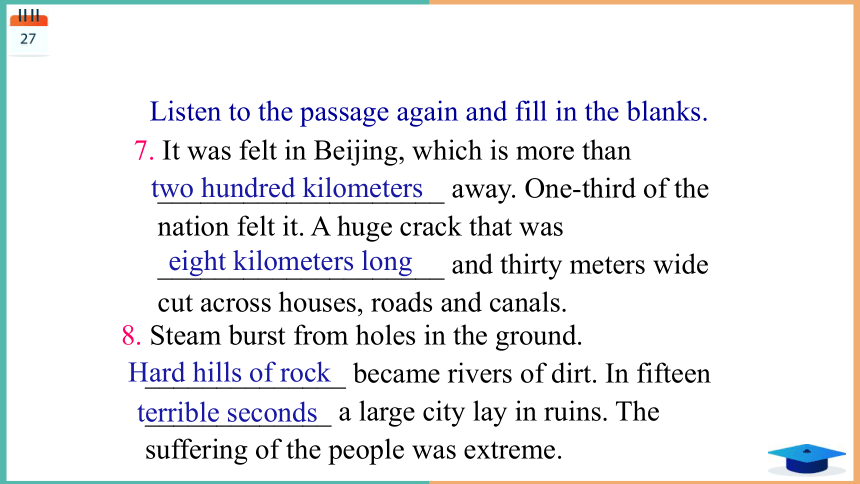
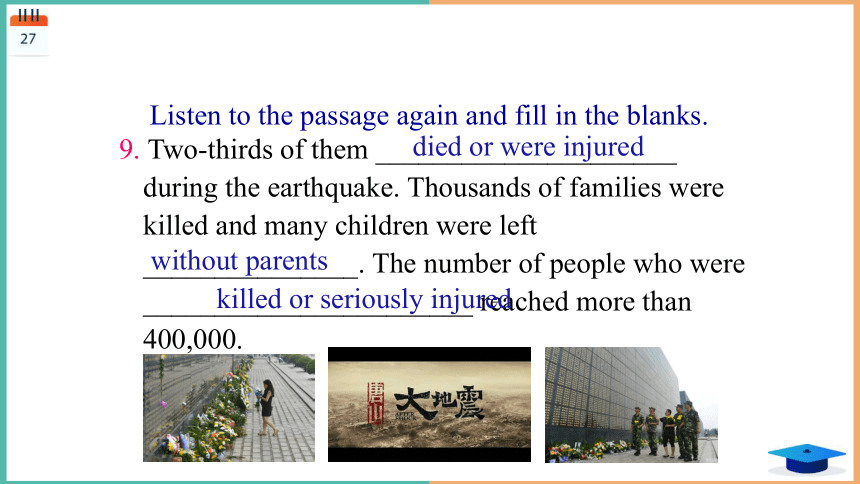
文档简介
人教版
高中英语
Unit
4
Reading
-2
Earthquakes
Look
at
the
pictures
please
!
Recollect
the
passage
you've
learned.
Recall
the
scene
in
the
passage
when
reading.
Read
the
passage
aloud
please.
Look
at
the
pictures
please
and
listen
to
the
passage
together
without
looking
at
your
text
book.
Listening
without
looking
at
your
text
book.
Listen
to
the
passage
again
and
fill
in
the
blanks.
1.
Strange
things
were
happening
in
the
countryside
of
______________
.
For
three
days
the
water
in
the
village
wells
_______________________
.
northeast
Hebei
rose
and
fell,
rose
and
fell
2.
Farmers
noticed
that
the
well
walls
had
_________________.
A
smelly
gas
came
out
of
the
cracks.
In
the
farmyards,
the
chickens
and
even
the
pigs
were
________________
.
deep
cracks
in
them
too
nervous
to
eat
3.
Mice
ran
out
of
the
fields
________________
to
hide.
Fish
jumped
out
of
their
_______________.
4.
At
about
3:00
am
on
July
28,
1976,
some
people
saw
____________
in
the
sky.
The
sound
of
planes
could
be
heard
outside
the
city
of
Tangshan
even
when
_____________
in
the
sky.
bowls
and
ponds
looking
for
places
bright
lights
no
planes
were
Listen
to
the
passage
again
and
fill
in
the
blanks.
5.
In
the
city,
the
water
pipes
in
some
buildings
_______________.
But
the
one
million
people
of
the
city,
who
________________________
,
were
asleep
as
usual
that
night.
6.
At
3:42
am
everything
began
to
shake.
_____________
the
world
was
at
an
end!
Eleven
kilometers
directly
below
the
city,
__________________________
of
the
20th
century
had
begun.
thought
little
of
these
events
cracked
and
burst
It
seemed
as
if
one
of
the
greatest
earthquake
Listen
to
the
passage
again
and
fill
in
the
blanks.
7.
It
was
felt
in
Beijing,
which
is
more
than
____________________
away.
One-third
of
the
nation
felt
it.
A
huge
crack
that
was
____________________
and
thirty
meters
wide
cut
across
houses,
roads
and
canals.
8.
Steam
burst
from
holes
in
the
ground.
______________
became
rivers
of
dirt.
In
fifteen
_____________
a
large
city
lay
in
ruins.
The
suffering
of
the
people
was
extreme.
eight
kilometers
long
two
hundred
kilometers
Hard
hills
of
rock
terrible
seconds
Listen
to
the
passage
again
and
fill
in
the
blanks.
9.
Two-thirds
of
them
_____________________
during
the
earthquake.
Thousands
of
families
were
killed
and
many
children
were
left
_______________.
The
number
of
people
who
were
_______________________
reached
more
than
400,000.
died
or
were
injured
without
parents
killed
or
seriously
injured
Listen
to
the
passage
again
and
fill
in
the
blanks.
10.
But
how
could
________________
believe
it
was
natural?
Everywhere
they
looked
nearly
everything
______________.
All
of
the
city’s
hospitals,
75%
of
its
______________________
and
90%
of
its
homes
were
gone.
the
survivors
was
destroyed
factories
and
buildings
Listen
to
the
passage
again
and
fill
in
the
blanks.
11.Bricks
covered
the
ground
like
______________.
No
wind,
however,
could
blow
them
away.
Two
dams
fell
and
most
of
the
bridges
also
fell
or
were
not
safe
____________.
The
railway
tracks
were
now
___________________.
red
autumn
leaves
for
traveling
useless
pieces
of
steel
Listen
to
the
passage
again
and
fill
in
the
blanks.
12.
Tens
of
thousands
of
cows
would
________________
again.
Half
a
million
pigs
and
millions
of
chickens
were
dead.
_______________
the
wells
instead
of
water.
People
______________.
never
give
milk
Sand
now
filled
were
shocked
Listen
to
the
passage
again
and
fill
in
the
blanks.
13.
Then,
later
that
afternoon,
another
big
quake
which
was
almost
_______________
the
first
one
shook
Tangshan.
Some
of
the
rescue
workers
and
doctors
_____________
under
the
ruins.
More
buildings
fell
down.
Water,
food,
and
_____________
were
hard
to
get.
People
began
to
wonder
how
long
_____________
would
last.
as
strong
as
were
trapped
electricity
the
disaster
Listen
to
the
passage
again
and
fill
in
the
blanks.
14.
All
hope
was
not
lost.
Soon
after
the
quakes,
the
army
____________________
to
Tangshan
to
help
the
rescue
workers.
____________________
of
people
were
helped.
The
army
organized
teams
to
dig
out
those
who
______________
and
to
bury
the
dead.
sent
150,000
soldiers
were
trapped
Hundreds
of
thousands
Listen
to
the
passage
again
and
fill
in
the
blanks.
15.
To
the
north
of
the
city,
most
of
the
10,000
miners
_____________
from
the
coal
mines
there.
Workers
built
shelters
for
__________
whose
homes
had
been
destroyed.
Fresh
water
was
taken
to
the
city
by
train,
truck
and
plane.
Slowly,
the
city
________________
again.
were
rescued
began
to
breathe
survivors
Comprehension
--
Exercise
1
B.
the
quake
happened
while
they
were
sleeping.
A.
the
army
came
to
help
them.
C.
they
were
nervous.
D.
dams
and
wells
were
useless.
1.
The
chickens
didn’t
eat
because
E.
they
didn’t
know
what
the
events
meant.
2.
The
people
didn’t
worry
because
3.
Such
a
great
number
of
people
died
because
4.
Water
was
needed
because
5.
The
people
didn’t
lose
hope
because
Comprehension
--
Exercise
2
{5C22544A-7EE6-4342-B048-85BDC9FD1C3A}TIME
EVENTS
For
three
days
1.
water
in
the
village
wells
rose
and
fell
2.
well
walls
developed
deep
cracks
3.
a
smelly
gas
came
out
of
the
cracks
4.
mice
ran
out
of
the
fields
5.
fish
jumped
out
of
their
bowls
and
ponds
At
about
3:00am
1.
bright
lights
appeared
in
the
sky
2.
the
sound
of
planes
could
be
heard
although
there
were
no
planes
3.
some
water
pipes
burst
{5C22544A-7EE6-4342-B048-85BDC9FD1C3A}TIME
EVENTS
At
3:42am
1.
everything
began
to
shake
2.
huge
cracks
appeared
in
the
roads
3.
steam
burst
from
holes
in
the
ground
4.
rock
turned
into
rivers
of
dirt
5.
75%
buildings
and
90%
of
homes
were
gone
6.
mire
than
400,000people
killed
or
injured
The
afternoon
1.
a
second
quake
almost
as
strong
as
the
first
one
2.
more
damage
to
buildings
and
rescuer
Soon
after
the
quake
1.the
army
arrived
2.
shelters
built
for
survivors
3.
water
supplies
brought
in
Comprehension
--
Exercise
3
The
suggested
answers:
Pra.1.
Before
the
earthquake
strange
things
began
to
happen
but
no
one
paid
attention
to
them,
and
the
people
were
asleep
as
usual.
Pra.
2.
The
earthquake
destroyed
the
city
of
Tangshan
and
the
large
city
lay
in
ruins
in
fifteen
terrible
prehension
--
Exercise
3
Pra.3.
The
people
were
very
shocked
at
the
destruction
and
they
didn’t
know
how
long
the
disaster
would
last
because
another
big
quake
shook
the
city
again
that
afternoon.
Pra.
4.
The
army
came
to
help
the
survivors,
shelters
were
built
and
water
supplies
were
brought
in,
which
made
the
city
began
to
recover
again.
Comprehension
--
Exercise
4
The
suggested
answers:
1.
The
title
of
the
passage,
A
night
the
earth
didn’t
sleep
is
a
poetic
way
of
saying
that
earthquake
happened.
2.
Another
title
might
be
the
following:
1)
Tangshan’
great
challenge
2)
Tangshan
big
earthquake
3)
The
great
disaster
in
Tangshan
4)
Tangshan
earthquake,
the
one
of
the
greatest
disasters
in
the
20th
century
Exercise
5:
Work
in
pairs
R:
Did
you
notice
anything
strange
before
the
earthquake?
S:
Yes,
I
know
a
little,
there
were
something
strange
before
the
earthquake
and
I
didn’t
see
all
of
them.
But
we
didn’t
pay
no
attention
to
them.
R:
What
did
you
see?
S:
I
saw
the
fish
jumped
out
of
their
bowls,
and
some
mice
were
running
in
the
streets.
R
=
reporter
S
=
survivor
Exercise
5:
Work
in
pairs
S:
And
some
cracks
in
pipes
on
some
buildings
but
I
didn’t
worry
too
much
about
them
neither.
R:
Did
you
hear
of
other
things?
S:
Yes,
I
did.
Some
people
said
that
they
saw
cracks
in
the
wells
and
a
smelly
gas
coming
out
of
them.
It
is
said
that
some
of
the
animals
behaved
strangely
too.
R:
What
were
you
doing
when
the
earthquake
happened?
R
=
reporter
S
=
survivor
Exercise
5:
Work
in
pairs
S:
I
was
on
duty
in
my
factory
when
everything
began
to
shake.
R:
That’s
why
you
didn’t
sleep
at
that
time.
S:
Yes,
that
was.
And
all
of
us,
the
workers
on
duty,
went
out
of
the
building,
and
join
the
rescue
team.
R:
Oh!
You
are
great!
And
thank
you
very
much!
You
have
been
very
helpful.
S:
You
are
welcome.
R
=
reporter
S
=
survivor
1.
Reviewed
the
passage.
2.
Listened
to
the
passage
in
the
class.
3.
Fill
in
the
blanks
according
to
what
you
hear.
4.
Finished
the
exercises
on
the
textbook.
5.
Finish
an
interview
about
the
earthquake.
We've
learned
the
following
in
the
class:
Homework
1.
Review
the
usage
of
the
words
and
phrases
in
the
passage
and
recited.
2.
Finish
the
exercises
and
read
the
reading
passage
aloud,
recite
some
of
the
sentence.
高中英语
Unit
4
Reading
-2
Earthquakes
Look
at
the
pictures
please
!
Recollect
the
passage
you've
learned.
Recall
the
scene
in
the
passage
when
reading.
Read
the
passage
aloud
please.
Look
at
the
pictures
please
and
listen
to
the
passage
together
without
looking
at
your
text
book.
Listening
without
looking
at
your
text
book.
Listen
to
the
passage
again
and
fill
in
the
blanks.
1.
Strange
things
were
happening
in
the
countryside
of
______________
.
For
three
days
the
water
in
the
village
wells
_______________________
.
northeast
Hebei
rose
and
fell,
rose
and
fell
2.
Farmers
noticed
that
the
well
walls
had
_________________.
A
smelly
gas
came
out
of
the
cracks.
In
the
farmyards,
the
chickens
and
even
the
pigs
were
________________
.
deep
cracks
in
them
too
nervous
to
eat
3.
Mice
ran
out
of
the
fields
________________
to
hide.
Fish
jumped
out
of
their
_______________.
4.
At
about
3:00
am
on
July
28,
1976,
some
people
saw
____________
in
the
sky.
The
sound
of
planes
could
be
heard
outside
the
city
of
Tangshan
even
when
_____________
in
the
sky.
bowls
and
ponds
looking
for
places
bright
lights
no
planes
were
Listen
to
the
passage
again
and
fill
in
the
blanks.
5.
In
the
city,
the
water
pipes
in
some
buildings
_______________.
But
the
one
million
people
of
the
city,
who
________________________
,
were
asleep
as
usual
that
night.
6.
At
3:42
am
everything
began
to
shake.
_____________
the
world
was
at
an
end!
Eleven
kilometers
directly
below
the
city,
__________________________
of
the
20th
century
had
begun.
thought
little
of
these
events
cracked
and
burst
It
seemed
as
if
one
of
the
greatest
earthquake
Listen
to
the
passage
again
and
fill
in
the
blanks.
7.
It
was
felt
in
Beijing,
which
is
more
than
____________________
away.
One-third
of
the
nation
felt
it.
A
huge
crack
that
was
____________________
and
thirty
meters
wide
cut
across
houses,
roads
and
canals.
8.
Steam
burst
from
holes
in
the
ground.
______________
became
rivers
of
dirt.
In
fifteen
_____________
a
large
city
lay
in
ruins.
The
suffering
of
the
people
was
extreme.
eight
kilometers
long
two
hundred
kilometers
Hard
hills
of
rock
terrible
seconds
Listen
to
the
passage
again
and
fill
in
the
blanks.
9.
Two-thirds
of
them
_____________________
during
the
earthquake.
Thousands
of
families
were
killed
and
many
children
were
left
_______________.
The
number
of
people
who
were
_______________________
reached
more
than
400,000.
died
or
were
injured
without
parents
killed
or
seriously
injured
Listen
to
the
passage
again
and
fill
in
the
blanks.
10.
But
how
could
________________
believe
it
was
natural?
Everywhere
they
looked
nearly
everything
______________.
All
of
the
city’s
hospitals,
75%
of
its
______________________
and
90%
of
its
homes
were
gone.
the
survivors
was
destroyed
factories
and
buildings
Listen
to
the
passage
again
and
fill
in
the
blanks.
11.Bricks
covered
the
ground
like
______________.
No
wind,
however,
could
blow
them
away.
Two
dams
fell
and
most
of
the
bridges
also
fell
or
were
not
safe
____________.
The
railway
tracks
were
now
___________________.
red
autumn
leaves
for
traveling
useless
pieces
of
steel
Listen
to
the
passage
again
and
fill
in
the
blanks.
12.
Tens
of
thousands
of
cows
would
________________
again.
Half
a
million
pigs
and
millions
of
chickens
were
dead.
_______________
the
wells
instead
of
water.
People
______________.
never
give
milk
Sand
now
filled
were
shocked
Listen
to
the
passage
again
and
fill
in
the
blanks.
13.
Then,
later
that
afternoon,
another
big
quake
which
was
almost
_______________
the
first
one
shook
Tangshan.
Some
of
the
rescue
workers
and
doctors
_____________
under
the
ruins.
More
buildings
fell
down.
Water,
food,
and
_____________
were
hard
to
get.
People
began
to
wonder
how
long
_____________
would
last.
as
strong
as
were
trapped
electricity
the
disaster
Listen
to
the
passage
again
and
fill
in
the
blanks.
14.
All
hope
was
not
lost.
Soon
after
the
quakes,
the
army
____________________
to
Tangshan
to
help
the
rescue
workers.
____________________
of
people
were
helped.
The
army
organized
teams
to
dig
out
those
who
______________
and
to
bury
the
dead.
sent
150,000
soldiers
were
trapped
Hundreds
of
thousands
Listen
to
the
passage
again
and
fill
in
the
blanks.
15.
To
the
north
of
the
city,
most
of
the
10,000
miners
_____________
from
the
coal
mines
there.
Workers
built
shelters
for
__________
whose
homes
had
been
destroyed.
Fresh
water
was
taken
to
the
city
by
train,
truck
and
plane.
Slowly,
the
city
________________
again.
were
rescued
began
to
breathe
survivors
Comprehension
--
Exercise
1
B.
the
quake
happened
while
they
were
sleeping.
A.
the
army
came
to
help
them.
C.
they
were
nervous.
D.
dams
and
wells
were
useless.
1.
The
chickens
didn’t
eat
because
E.
they
didn’t
know
what
the
events
meant.
2.
The
people
didn’t
worry
because
3.
Such
a
great
number
of
people
died
because
4.
Water
was
needed
because
5.
The
people
didn’t
lose
hope
because
Comprehension
--
Exercise
2
{5C22544A-7EE6-4342-B048-85BDC9FD1C3A}TIME
EVENTS
For
three
days
1.
water
in
the
village
wells
rose
and
fell
2.
well
walls
developed
deep
cracks
3.
a
smelly
gas
came
out
of
the
cracks
4.
mice
ran
out
of
the
fields
5.
fish
jumped
out
of
their
bowls
and
ponds
At
about
3:00am
1.
bright
lights
appeared
in
the
sky
2.
the
sound
of
planes
could
be
heard
although
there
were
no
planes
3.
some
water
pipes
burst
{5C22544A-7EE6-4342-B048-85BDC9FD1C3A}TIME
EVENTS
At
3:42am
1.
everything
began
to
shake
2.
huge
cracks
appeared
in
the
roads
3.
steam
burst
from
holes
in
the
ground
4.
rock
turned
into
rivers
of
dirt
5.
75%
buildings
and
90%
of
homes
were
gone
6.
mire
than
400,000people
killed
or
injured
The
afternoon
1.
a
second
quake
almost
as
strong
as
the
first
one
2.
more
damage
to
buildings
and
rescuer
Soon
after
the
quake
1.the
army
arrived
2.
shelters
built
for
survivors
3.
water
supplies
brought
in
Comprehension
--
Exercise
3
The
suggested
answers:
Pra.1.
Before
the
earthquake
strange
things
began
to
happen
but
no
one
paid
attention
to
them,
and
the
people
were
asleep
as
usual.
Pra.
2.
The
earthquake
destroyed
the
city
of
Tangshan
and
the
large
city
lay
in
ruins
in
fifteen
terrible
prehension
--
Exercise
3
Pra.3.
The
people
were
very
shocked
at
the
destruction
and
they
didn’t
know
how
long
the
disaster
would
last
because
another
big
quake
shook
the
city
again
that
afternoon.
Pra.
4.
The
army
came
to
help
the
survivors,
shelters
were
built
and
water
supplies
were
brought
in,
which
made
the
city
began
to
recover
again.
Comprehension
--
Exercise
4
The
suggested
answers:
1.
The
title
of
the
passage,
A
night
the
earth
didn’t
sleep
is
a
poetic
way
of
saying
that
earthquake
happened.
2.
Another
title
might
be
the
following:
1)
Tangshan’
great
challenge
2)
Tangshan
big
earthquake
3)
The
great
disaster
in
Tangshan
4)
Tangshan
earthquake,
the
one
of
the
greatest
disasters
in
the
20th
century
Exercise
5:
Work
in
pairs
R:
Did
you
notice
anything
strange
before
the
earthquake?
S:
Yes,
I
know
a
little,
there
were
something
strange
before
the
earthquake
and
I
didn’t
see
all
of
them.
But
we
didn’t
pay
no
attention
to
them.
R:
What
did
you
see?
S:
I
saw
the
fish
jumped
out
of
their
bowls,
and
some
mice
were
running
in
the
streets.
R
=
reporter
S
=
survivor
Exercise
5:
Work
in
pairs
S:
And
some
cracks
in
pipes
on
some
buildings
but
I
didn’t
worry
too
much
about
them
neither.
R:
Did
you
hear
of
other
things?
S:
Yes,
I
did.
Some
people
said
that
they
saw
cracks
in
the
wells
and
a
smelly
gas
coming
out
of
them.
It
is
said
that
some
of
the
animals
behaved
strangely
too.
R:
What
were
you
doing
when
the
earthquake
happened?
R
=
reporter
S
=
survivor
Exercise
5:
Work
in
pairs
S:
I
was
on
duty
in
my
factory
when
everything
began
to
shake.
R:
That’s
why
you
didn’t
sleep
at
that
time.
S:
Yes,
that
was.
And
all
of
us,
the
workers
on
duty,
went
out
of
the
building,
and
join
the
rescue
team.
R:
Oh!
You
are
great!
And
thank
you
very
much!
You
have
been
very
helpful.
S:
You
are
welcome.
R
=
reporter
S
=
survivor
1.
Reviewed
the
passage.
2.
Listened
to
the
passage
in
the
class.
3.
Fill
in
the
blanks
according
to
what
you
hear.
4.
Finished
the
exercises
on
the
textbook.
5.
Finish
an
interview
about
the
earthquake.
We've
learned
the
following
in
the
class:
Homework
1.
Review
the
usage
of
the
words
and
phrases
in
the
passage
and
recited.
2.
Finish
the
exercises
and
read
the
reading
passage
aloud,
recite
some
of
the
sentence.
